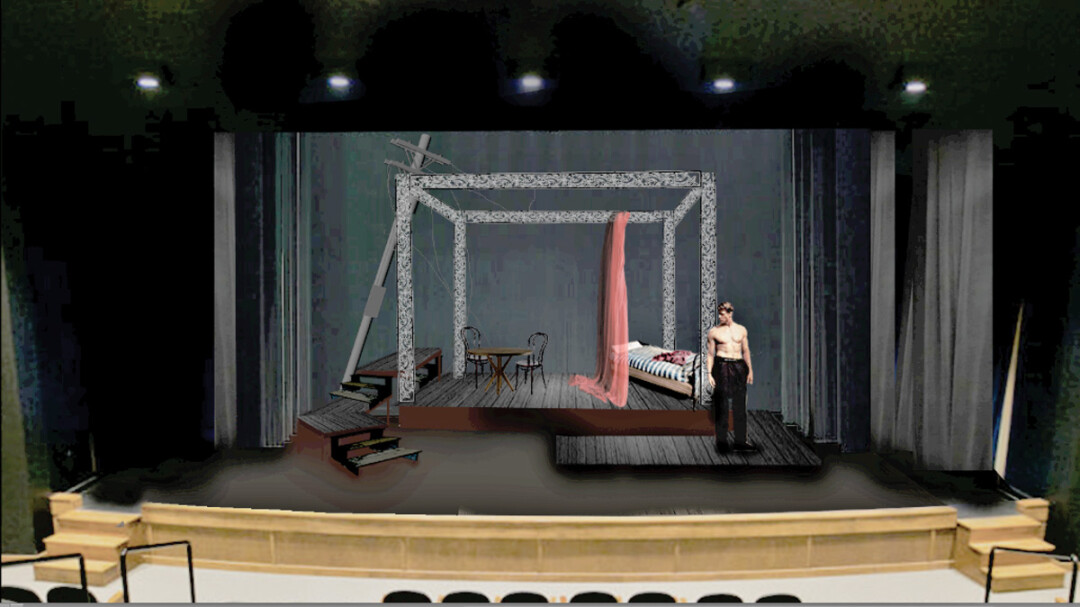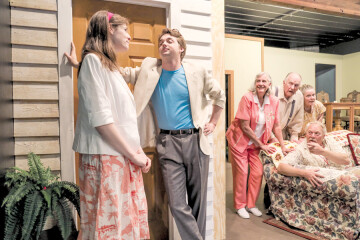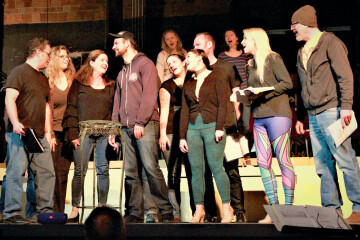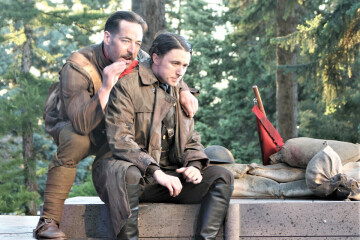A Streetcar Named Desire

Big Sky Community Theater is offering a production of Tennessee Williams’s A Streetcar Named Desire. Streetcar will be performed for one day only, May 16, at the Warren Miller Center for the Performing Arts in Big Sky. Directed by Mark Kuntz, produced by John Zirkle, using only Big Sky actors, Streetcar brings the complicated claustrophobia of antagonistic relationships to the stage.
Playwright Tennessee Williams wrote A Streetcar Named Desire in 1947, two years after his breakout play, The Glass Menagerie. Williams is considered one of America’s top three playwrights of the 20th century alongside Eugene O’Neill and Arthur Miller. Williams was born in Mississippi and lived there until he was 9 years old, when his father, a traveling salesman, moved the family to St. Louis, where Williams learned his love of writing. As a young man, Williams fell in love with New Orleans, soaking up the southern culture enough to set many of his plays in the deep south, and – as in the case of Streetcar –New Orleans.
A Streetcar Named Desire is the story of Blanche, a 30-something southern school-teacher with upper-class pretensions, who moves in with her sister Stella and her husband, Stanley, a hard-drinking, poker-playing auto-parts salesman. As a young woman, Blanche becomes disillusioned after the failure of an impossible love, which causes her slow unraveling and retreat into a world of fantasy. When Blanche moves into Stanley and Stella’s small apartment, Blanche escapes into illusions of her imagined higher-class life, which drives Stanley mad. The interchange between Stanley, Stella, and Blanche becomes symbolic of a new world: Blanche represents the death of the antebellum South, while Stanley and Stella signify the emergence of a new working class.
Stephanie Kissel – playing “Blanche” in Streetcar — has lived in Big Sky for ten years, previously appeared in Big Sky Community Theatre’s productions of The Importance of Being Ernest and Nothing Serious. Before Kissel accepted the role of Blanche, she talked to her husband about her playing that role; it’s no easy thing to go back and forth between her family in 2019 in Big Sky, to the theater where she becomes a woman bound by a culture and community so vastly different from Big Sky and Montana. She leaves her Big Sky home and drives the few minutes to the Warren Miller Center for rehearsals, steps through the door and puts on the character and costume of a woman seeking peace and comfort through illusion and fantasy.
Kissell finds it challenging to not be judgmental of Blanche, as Blanche has many flawed character traits. To ‘become’ Blanche, Kissell researched other performances of Streetcar, read reviews, and held discussions with Kuntz and other cast members to understand Blanche’s motivations. In the process, Kissell found herself becoming empathetic with Blanche, at least enough to connect with her character. “My goal is to portray her as honestly but humanely as possible. I’d like the audience to find themselves relating to her,” Kissell says.
Mark Kuntz brings years of experience as an actor, director, and film producer on local and national stages as he reacts against common concepts of staging Streetcar. His directorial concept for this play cuts the script in such a way that avoids references to any specific time, place, or element that could place this play in New Orleans, the South, or anywhere specific. Kuntz uses an abstract set design to blur the walls between inside and outside, to convey the sense of the interconnectedness of the inner and outer spaces of the Kowalskis’ apartment, as well as the inner and outer struggles people face, the problem of fantasy versus reality. The bare set design requires the audience to engage, using their imaginations to fill in the walls that aren’t there, the streets outside, and the rest of the Kowalski apartment. Kuntz hopes this will free the audience to understand the universality of this play to transcend the 1940s South, and accept it as something we can all feel a part of – a sense of claustrophobia, of being trapped by our own choices and fantasies, not unlike the lives of Stanley, Blanch, Stella, and Mitch.
Big Sky Community Theatre continues the tradition of what all theater once was: theater by the community, of the community, and for the community. From the beginning of time, people put on performances as a way of telling stories and as a way of communicating to others. It’s part of the way humans are built — almost in our DNA – to put on performances to explore ideas, to tell stories, and to teach others certain truths.
Community theater often gets a bad rap, with aspersions of inferior quality theater attached to the label. “Oh, it’s just community theater” has often been said dismissively about theater companies that arise out of citizens’ desire to perform, see live plays, interpret drama as they would conceive of it. Kuntz takes strong issue with that negative stereotype of community theater: “Often the community theater has actors who are every bit as good as professionals; further, it’s simply a pure joy to work with community members who are there because they simply love it and are willing to put the work into memorizing the lines, working on the blocking, investing themselves in the passion of the play, all for the simple pleasure of putting on a performance for their friends and neighbors – and themselves.”
Big Sky Community Theatre proudly continues to fill that historic human need for community theater, putting on one show per year in the Warren Miller Community Performing Arts Center with the entire cast coming from the Big Sky community. Stephanie Kissell confirms: “I’ve loved being a part of community theater. It is so fulfilling to be involved in the creative process – to collaborate, learn, and take risks with a supportive group of peers creates a truly meaningful experience.”
A Streetcar Named Desire will be performed at the Warren Miller Center in Big Sky for one night only, Thursday May 16, at 7 p.m. Tickets can be purchased beginning on April 15 at https://warrenmillerpac.org/get-tickets





